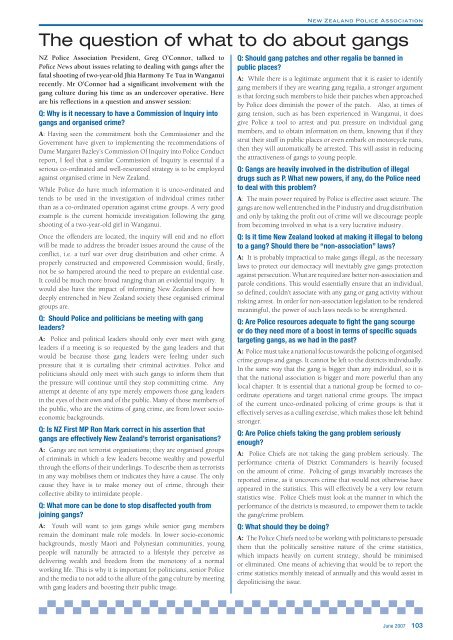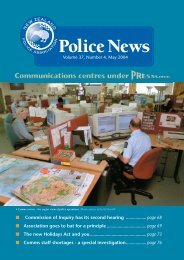Police News June 07.indd - New Zealand Police Association
Police News June 07.indd - New Zealand Police Association
Police News June 07.indd - New Zealand Police Association
Create successful ePaper yourself
Turn your PDF publications into a flip-book with our unique Google optimized e-Paper software.
<strong>New</strong> <strong>Zealand</strong> <strong>Police</strong> <strong>Association</strong>The question of what to do about gangsNZ <strong>Police</strong> <strong>Association</strong> President, Greg O’Connor, talked to<strong>Police</strong> <strong><strong>New</strong>s</strong> about issues relating to dealing with gangs after thefatal shooting of two-year-old Jhia Harmony Te Tua in Wanganuirecently. Mr O’Connor had a significant involvement with thegang culture during his time as an undercover operative. Hereare his reflections in a question and answer session:Q: Why is it necessary to have a Commission of Inquiry intogangs and organised crime?A: Having seen the commitment both the Commissioner and theGovernment have given to implementing the recommendations ofDame Margaret Bazley’s Commission Of Inquiry into <strong>Police</strong> Conductreport, I feel that a similar Commission of Inquiry is essential if aserious co-ordinated and well-resourced strategy is to be employedagainst organised crime in <strong>New</strong> <strong>Zealand</strong>.While <strong>Police</strong> do have much information it is unco-ordinated andtends to be used in the investigation of individual crimes ratherthan as a co-ordinated operation against crime groups. A very goodexample is the current homicide investigation following the gangshooting of a two-year-old girl in Wanganui.Once the offenders are located, the inquiry will end and no effortwill be made to address the broader issues around the cause of theconflict, i.e. a turf war over drug distribution and other crime. Aproperly constructed and empowered Commission would, firstly,not be so hampered around the need to prepare an evidential case.It could be much more broad ranging than an evidential inquiry. Itwould also have the impact of informing <strong>New</strong> <strong>Zealand</strong>ers of howdeeply entrenched in <strong>New</strong> <strong>Zealand</strong> society these organised criminalgroups are.Q: Should <strong>Police</strong> and politicians be meeting with gangleaders?A: <strong>Police</strong> and political leaders should only ever meet with gangleaders if a meeting is so requested by the gang leaders and thatwould be because those gang leaders were feeling under suchpressure that it is curtailing their criminal activities. <strong>Police</strong> andpoliticians should only meet with such gangs to inform them thatthe pressure will continue until they stop committing crime. Anyattempt at detente of any type merely empowers those gang leadersin the eyes of their own and of the public. Many of those members ofthe public, who are the victims of gang crime, are from lower socioeconomicbackgrounds.Q: Is NZ First MP Ron Mark correct in his assertion thatgangs are effectively <strong>New</strong> <strong>Zealand</strong>’s terrorist organisations?A: Gangs are not terrorist organisations; they are organised groupsof criminals in which a few leaders become wealthy and powerfulthrough the efforts of their underlings. To describe them as terroristsin any way mobilises them or indicates they have a cause. The onlycause they have is to make money out of crime, through theircollective ability to intimidate people.Q: What more can be done to stop disaffected youth fromjoining gangs?A: Youth will want to join gangs while senior gang membersremain the dominant male role models. In lower socio-economicbackgrounds, mostly Maori and Polynesian communities, youngpeople will naturally be attracted to a lifestyle they perceive asdelivering wealth and freedom from the monotony of a normalworking life. This is why it is important for politicians, senior <strong>Police</strong>and the media to not add to the allure of the gang culture by meetingwith gang leaders and boosting their public image.Q: Should gang patches and other regalia be banned inpublic places?A: While there is a legitimate argument that it is easier to identifygang members if they are wearing gang regalia, a stronger argumentis that forcing such members to hide their patches when approachedby <strong>Police</strong> does diminish the power of the patch. Also, at times ofgang tension, such as has been experienced in Wanganui, it doesgive <strong>Police</strong> a tool to arrest and put pressure on individual gangmembers, and to obtain information on them, knowing that if theystrut their stuff in public places or even embark on motorcycle runs,then they will automatically be arrested. This will assist in reducingthe attractiveness of gangs to young people.Q: Gangs are heavily involved in the distribution of illegaldrugs such as P. What new powers, if any, do the <strong>Police</strong> needto deal with this problem?A: The main power required by <strong>Police</strong> is effective asset seizure. Thegangs are now well entrenched in the P industry and drug distributionand only by taking the profit out of crime will we discourage peoplefrom becoming involved in what is a very lucrative industry.Q: Is it time <strong>New</strong> <strong>Zealand</strong> looked at making it illegal to belongto a gang? Should there be “non-association” laws?A: It is probably impractical to make gangs illegal, as the necessarylaws to protect our democracy will inevitably give gangs protectionagainst persecution. What are required are better non-association andparole conditions. This would essentially ensure that an individual,so defined, couldn’t associate with any gang or gang activity withoutrisking arrest. In order for non-association legislation to be renderedmeaningful, the power of such laws needs to be strengthened.Q: Are <strong>Police</strong> resources adequate to fight the gang scourgeor do they need more of a boost in terms of specific squadstargeting gangs, as we had in the past?A: <strong>Police</strong> must take a national focus towards the policing of organisedcrime groups and gangs. It cannot be left to the districts individually.In the same way that the gang is bigger than any individual, so it isthat the national association is bigger and more powerful than anylocal chapter. It is essential that a national group be formed to coordinateoperations and target national crime groups. The impactof the current unco-ordinated policing of crime groups is that iteffectively serves as a culling exercise, which makes those left behindstronger.Q: Are <strong>Police</strong> chiefs taking the gang problem seriouslyenough?A: <strong>Police</strong> Chiefs are not taking the gang problem seriously. Theperformance criteria of District Commanders is heavily focusedon the amount of crime. Policing of gangs invariably increases thereported crime, as it uncovers crime that would not otherwise haveappeared in the statistics. This will effectively be a very low returnstatistics wise. <strong>Police</strong> Chiefs must look at the manner in which theperformance of the districts is measured, to empower them to tacklethe gang/crime problem.Q: What should they be doing?A: The <strong>Police</strong> Chiefs need to be working with politicians to persuadethem that the politically sensitive nature of the crime statistics,which impacts heavily on current strategy, should be minimisedor eliminated. One means of achieving that would be to report thecrime statistics monthly instead of annually and this would assist indepoliticising the issue.<strong>June</strong> 2007103
















